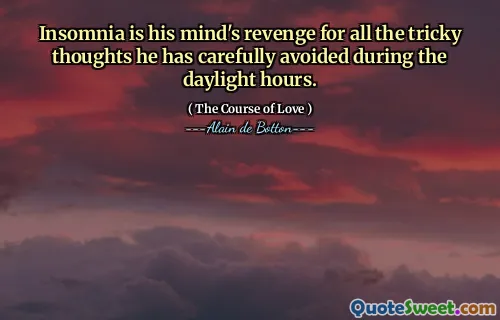
Insomnia is his mind's revenge for all the tricky thoughts he has carefully avoided during the daylight hours.
This quote highlights the complex relationship between our conscious efforts to suppress difficult thoughts and the subconscious mechanisms that ultimately draw those suppressed notions to the surface. In many ways, it suggests that avoiding certain uncomfortable or challenging thoughts during our active hours doesn’t eliminate their presence; instead, it allows them to fester beneath the surface, perhaps manifesting in restless nights of insomnia. The idea resonates with the human tendency to suppress emotion or worry rather than confront it outright, often leading to more profound internal conflict. When we fail to address the unease or complexity within our minds, we may unintentionally give these thoughts the freedom to surface during quiet, unguarded moments like sleep. Insomnia, therefore, becomes a form of mental retribution—a consequence of neglecting internal truths, and a reminder that avoidance isn't a sustainable solution for inner peace.
This quote also touches on the importance of self-awareness and emotional honesty. Facing difficult thoughts head-on, while uncomfortable, can be a crucial step toward resolution and peace of mind. Denial or avoidance might offer temporary relief, but in the long run, ignoring our internal struggles can lead to persistent unrest, symbolized here by sleeplessness. It presents an insightful commentary on the mind's innate need for integration and acceptance of all thoughts, no matter how tricky or uncomfortable they may be. By acknowledging our inner conflicts instead of suppressing them, we can achieve a more harmonious mental state, potentially alleviating the unrest that keeps us awake at night.








